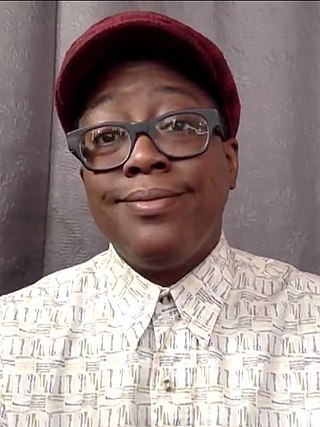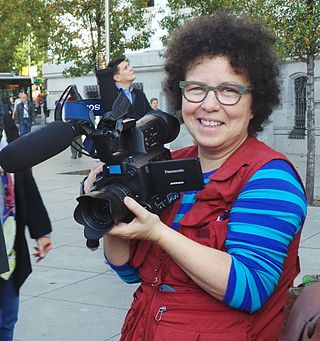Related Research Articles
Queercore is a cultural/social movement that began in the mid-1980s as an offshoot of the punk subculture and a music genre that comes from punk rock. It is distinguished by its discontent with society in general, and specifically society's disapproval of the LGBT community. Queercore expresses itself in a DIY style through magazines, music, writing and film.

Kathleen Hanna is an American singer, musician and pioneer of the feminist punk riot grrrl movement, and punk zine writer. In the early-to-mid-1990s, she was the lead singer of feminist punk band Bikini Kill, and then fronted the electropunk band Le Tigre in the late 1990s and early 2000s. Since 2010, she has recorded as the Julie Ruin.

The PXL2000, or Pixelvision, was a toy black and white video camera, introduced by Fisher-Price in 1987 at the International Toy Fair in Manhattan, which could record sound and images onto Compact Cassette tapes. It was on the market for one year with about 400,000 units produced. After that one year, it was pulled by the market, but rediscovered in the 1990s by low-budget filmmakers who appreciated the grainy, shimmering, monochrome produced by the unit, and the way in which its lens allowed the user to photograph a subject an eighth of an inch away from the camera, and pull back to a long shot without manipulating a dial, while keeping as the background and the foreground in focus. It is also appreciated by collectors, artists, and media historians, and has been used in major films and spawned dedicated film festivals.

Sadie T. Benning is an American artist, who has worked primarily in video, painting, drawing, sculpture, photography and sound. Benning creates experimental films and explores a variety of themes including surveillance, gender, ambiguity, transgression, play, intimacy, and identity. They became a known artist as a teenager, with their short films made with a PixelVision camera that have been described as "video diaries".

Johanna Rachel Fateman is an American writer, songwriter, musician, and record producer. She is a member of the electropunk band Le Tigre and founded the band MEN with Le Tigre bandmate JD Samson.

Barbara Jean Hammer was an American feminist film director, producer, writer, and cinematographer. She is known for being one of the pioneers of the lesbian film genre, and her career spanned over 50 years. Hammer is known for having created experimental films dealing with women's issues such as gender roles, lesbian relationships, coping with aging, and family life. She resided in New York City and Kerhonkson, New York, and taught each summer at the European Graduate School.

Tammy Rae Carland, is a photographer, video artist, zine editor, current provost at California College of the Arts (CCA), and former co-owner of the independent lesbian music label Mr. Lady Records and Videos. Her work has been published, screened, and exhibited around the world in galleries and museums in New York, Los Angeles, San Francisco, Berlin, and Sydney.

Jocelyn Rachel Samson, known professionally as JD Samson, is an American musician, producer, songwriter and DJ best known as a member of the bands Le Tigre and MEN.

Mr. Lady Records was a San Francisco-based lesbian-feminist independent record label and video art distributor. Artists on the label included Le Tigre and The Butchies. OutSmart magazine noted that Mr. Lady was "queercore's strongest label."

Jenni Olson is a writer, archivist, historian, consultant, and non-fiction filmmaker based in Berkeley, California. She co-founded the pioneering LGBT website PlanetOut.com. Her two feature-length essay films — The Joy of Life (2005) and The Royal Road (2015) — premiered at the Sundance Film Festival. Her work as an experimental filmmaker and her expansive personal collection of LGBTQ film prints and memorabilia were acquired in April 2020 by the Harvard Film Archive, and her reflection on the last 30 years of LGBT film history was published as a chapter in The Oxford Handbook of Queer Cinema from Oxford University Press in 2021. In 2020, she was named to the Out Magazine Out 100 list. In 2021, she was recognized with the prestigious Special TEDDY Award at the Berlin Film Festival. She also campaigned to have a barrier erected on the Golden Gate Bridge to prevent suicides.

Cheryl Dunye is a Liberian-American film director, producer, screenwriter, editor and actress. Dunye's work often concerns themes of race, sexuality, and gender, particularly issues relating to black lesbians. She is known as the first out black lesbian to ever direct a feature film with her 1996 film The Watermelon Woman. She runs the production company Jingletown Films based in Oakland, California.
Lucy Thane is a British documentary filmmaker, event producer and performer, living in Folkestone. Her films include It Changed My Life: Bikini Kill in the UK (1993) and She's Real (1997).
Su Friedrich is an American avant-garde film director, producer, writer, and cinematographer. She has been a leading figure in avant-garde filmmaking and a pivotal force in the establishment of Queer Cinema.

Nitrate Kisses is a 1992 experimental documentary film directed by Barbara Hammer. According to Hammer, it is an exploration of the repression and marginalization of LGBT people since the First World War. To celebrate the 30th anniversary of the Teddy Awards, the film was selected to be shown at the 66th Berlin International Film Festival in February 2016.
Feminism has affected culture in many ways, and has famously been theorized in relation to culture by Angela McRobbie, Laura Mulvey and others. Timothy Laurie and Jessica Kean have argued that "one of [feminism's] most important innovations has been to seriously examine the ways women receive popular culture, given that so much pop culture is made by and for men." This is reflected in a variety of forms, including literature, music, film and other screen cultures.
Riot grrrl is an underground feminist punk movement that began during the early 1990s within the United States in Olympia, Washington, and the greater Pacific Northwest, and has expanded to at least 26 other countries. A subcultural movement that combines feminism, punk music, and politics, it is often associated with third-wave feminism, which is sometimes seen as having grown out of the riot grrrl movement and has recently been seen in fourth-wave feminist punk music that rose in the 2010s. The genre has also been described as coming out of indie rock, with the punk scene serving as an inspiration for a movement in which women could express anger, rage, and frustration, emotions considered socially acceptable for male songwriters but less commonly for women.
Me and Rubyfruit is a short 1989/1990 videorecording by American artist Sadie Benning that runs for 5 minutes and was recorded with PixelVision camera in black and white. The title alludes to Rubyfruit Jungle, a 1973 novel by Rita Mae Brown that has explicitly lesbian themes.

Cecilia Barriga is a Chilean-Spanish film director. Her 1991 film Meeting Two Queens was shown at Montreal Women's Film and Video Festival and New York International Festival of Gay and Lesbian Film. She directed her first feature film Time's Up! in New York City. It premiered at the Donostia-San Sebastián Film Festival in 2000 as part of Zabaltegi.
Honey Lee Cottrell was a lesbian photographer and filmmaker who lived most of her life in San Francisco, California. Her papers are part of the Human Sexuality Collection at Cornell University Library.

The Melbourne Queer Film Festival (MQFF) is an annual LGBT film festival held in Melbourne, Victoria, Australia in November. Founded in 1991, it is the largest queer film event in the Southern Hemisphere, in 2015 attracting around 23,000 attendees at key locations around Melbourne.
References
- ↑ Curnutte, Rick. "The Film Journal". Child's Play: The Pixelvision Videos of Sadie Benning. Movie Review Query Engine. Retrieved 2013-04-25.
- 1 2 3 Holmlund, Chris (1997). Between the Sheets, in the Streets: Queer, Lesbian, Gay Documentary . Minnesota: University of Minnesota Press. p. 133. ISBN 0816627754.
- ↑ "PixelVision". Balagan Experimental Film & Video Series. Retrieved April 24, 2013.
- ↑ "Girl Power". Video Data Bank.
- ↑ Freeman, Elizabeth (2013). Deep Lez: Temporal Drag and Specters of Feminism. Time Binds: Queer Temporalities, Queer Histories: Duke University Press. pp. 82. ISBN 978-0822348047.
- ↑ Kearney, Mary (2003). Girls Make Movies. Youth Cultures: Texts, Images, and Identities: Praeger Publishers. p. 22. ISBN 9780275974091.